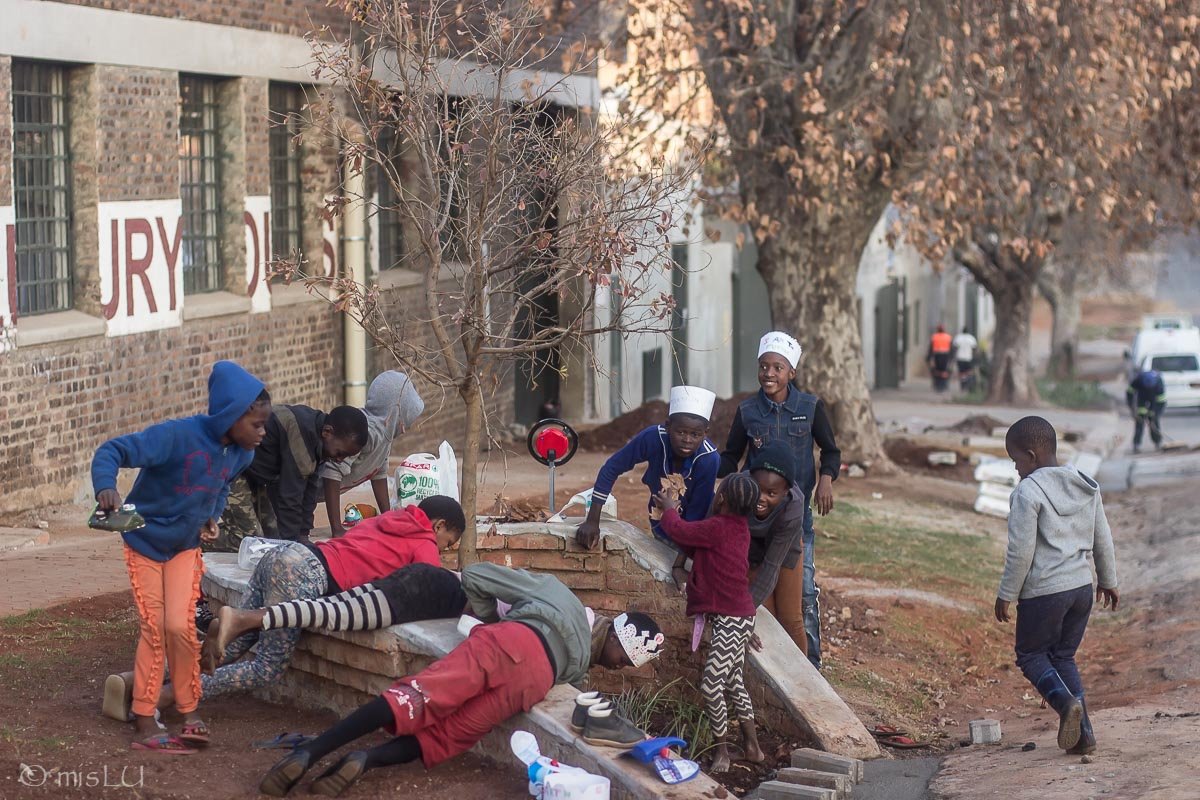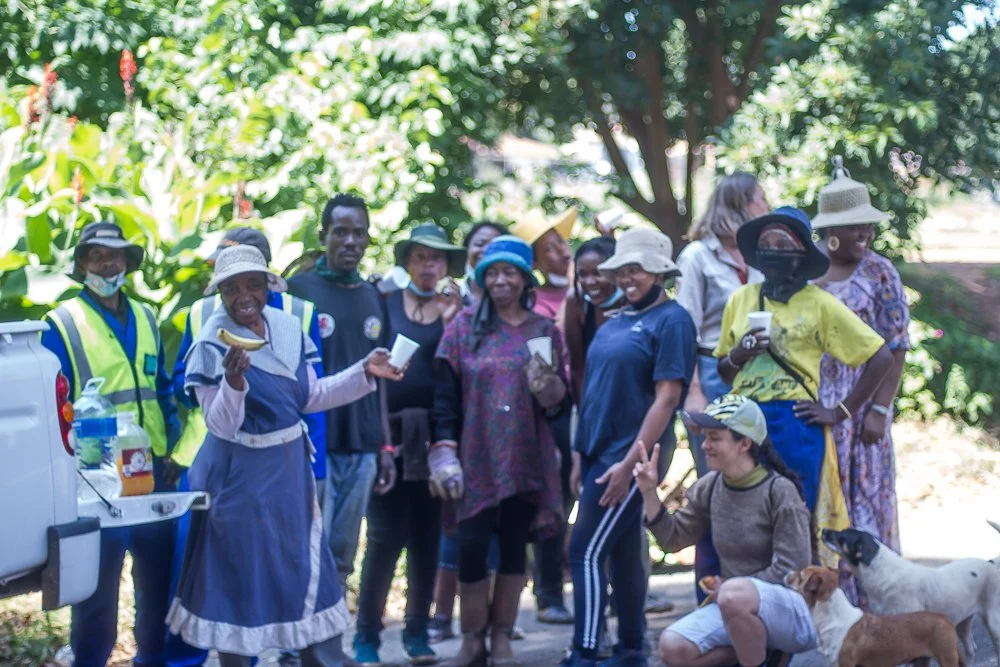
Collaborative Solutions
Water for the Future envisions an accessible, walkable, green corridor along the river that enables a thriving ecosystem and contributes to the economic prosperity, health and well-being of Johannesburg’s citizens.
But sustainable rehabilitation is only possible with the interest, support and cooperation of all civil sectors.
We strive to break down barriers and nurture relationships between City officials, local businesses and resident communities. This page details the relationships we have developed and how these have led to the achievements so far.
-
Our work is based on environmental and social studies by experts who contribute invaluable skills and knowledge to the complex issues facing this urban stretch of the Jukskei.
Through our roundtable discussions and mulitple forms of advocacy, Water for the Future is associated with ongoing research being conducted through University of Johannesburg (UJ-PEETS), SRK Consulting, Bureau Veritas and Campbell Scientific, as well as Stellenbosch’s Chair in Science Communication.
Water for the Future’s trajectory as a partner to science and research began when our team made contact with Paul Fairall (d.2018), Chairman of the Jukskei River Rejuvenation Project, an older public benefit group who had worked to clean the Jukskei throughout the nineties and 2000s. In addition to Paul’s guidance through CoJ legislation and the complex politics involved, he advised that fresh data needed to be commissioned so that informed decisions and plans could be developed based on reliable information.
Paul compiled the list of specialists from around the country who would need to produce reports on the status quo of the different entities such as soil, hydrology and infrastructure assessments. The funding was raised for these reports from the original seed funders of the project by Nando’s and Victoria Yards. These findings were then presented in a number of spaces and to various representatives: an auditorium manner to the panel of experts, an international representative from Eco-districts, city officials from relevant departments, funding bodies, key changemakers and socially-mobilised people from the area.
The City of Johannesburg Environment and Infrastructure Services (COJ-EISD) raised the crucial need for improving water quality as being based in an understanding of the fluctuation of the river current and the rate of the flow. This information has been missing since the 1980s! Dr Simon Lorentz, principal hydrologist at SRK and part of the WFTF team, then procured a remote flow rate monitor with data receptor that was embedded in the culvert to start the monitoring of the flow. The next logical step in the remediation was the alien invasive removal programme of the VY block (as the perimeter could be secured for safety purposes) so that infrastructure assessments could be made of the culvert and existing stormwater and sewage systems.
-
The river course touches on many different aspects of the legislation. From engaging with the various City of Johannesburg departments, it became clear that our project is functioning as a catalyst: it is encouraging departments that usually work in silos to approach this remediation opportunity from multiple angles.
Water for the Future has had ongoing discussions and applications with government officials from Johannesburg Inner City Partnership, Johannesburg Development Agency (JDA), Johannesburg Roads Agency (JRA), GDARD (Gauteng Department of Agriculture, Land Reform and Rural Development) City of Johannesburg Development Planning, and City of Johannesburg Environment and Infrastructure Services (COJ-EISD).
Through applying for the Our City our Block grant via the JDA in 2018, we learnt that multiple stakeholders would be required to make this project a reality. Through the application process and being shortlisted we were guided through many ‘vetting processes’ so that the project adhered and met their respective key performance indicators.
One of the exercises included attending a week-long Eco-Districts training sponsored by the USAID South Africa Low Emissions development programme in collaboration with the city. Our project was one of three case studies that the civil servants and diverse Eco-district panel referenced as relevant work that was approaching the work needed to remediate the river course from a holistic perspective based on original permaculture practices of where the intersection exists between man and nature.
We have also been part of numerous stakeholder engagement sessions and CID discussions since the original Upper Jukskei Catchment forum was created, which is also commissioning a management plan (to be published by CoJ-EISD via Fourth Element middle 2022). This manifested in intensive and productive roundtable sessions with other activated river groups situated along the length of the Jukskei river.
-
Key to WFTF’s approach is that solutions are co-designed with the community to meet their needs, and are not simply imposed on them. We have put much work into how our advocacy and education initiatives take the form of engagement, partnership, and joint planning.
Some examples of our co-designed projects include, for one, the Eco-tree seat: multiple stakeholders engaged with City for their knowledge around the need for rainwater harvesting/ reticulation in this part of the catchment.
City contractors, landowners, WFTF team engineers (original concept by Chris Brooker) architects and artist Hannelie Coetzee designed the Eco-Tree Seat based on the community’s stated need for more shaded public seating, and the need for more visible public seating that assist with lessening crime.
Our IAP removal programme has also included the commmunity on all key levels: based on the sensitivity audit and management plan, we issued a public tender via social media networks and displayed board advertising in high traffic areas in the valley. City of Johannesburg networks were approached to advise on recommended removal experts. Youth were hired through Harambee, an informal job sector department, so that legitimate hiring practices could be proven to the immediate community. Training opportunity sought to guide mobilised community members to start and run their own IAP removal business secured with Avocado Vision – leaders in the field.
Water for the Future is continuing to train community volunteers in IAP removal and processing. Our work has progressed downstream to the settlement of Ndawo Entle field, where a processing station is being developed.

Support us
There are many ways you can make a difference.




